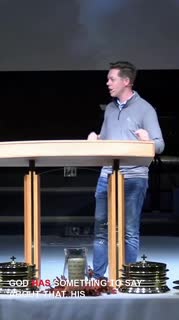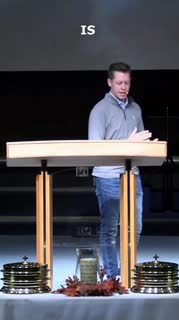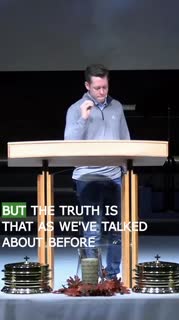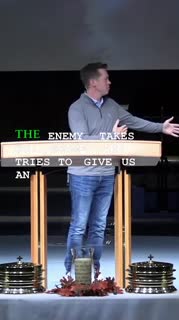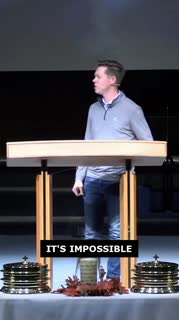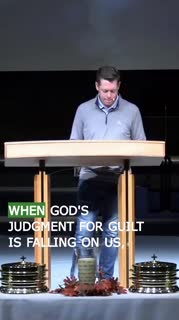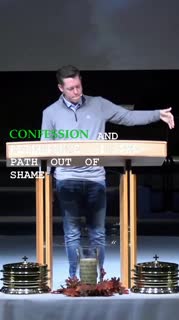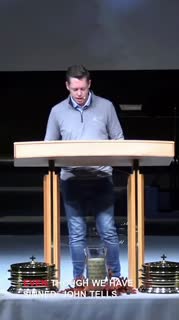Transforming Shame into Worship Through God's Grace
Devotional
Sermon Summary
Bible Study Guide
Sermon Clips
Every week this is just a reset, right? We get to sing praise to our God and I love that last song we sang because it recognizes his power and his majesty and his worthiness for us to sing to him and for us to live for him. So we are in a series this week is week two. Last week Pastor Michael came up here and wanted to kind of introduce this a little bit because I'm going to be here this week and next week preaching and so he's taking some time to prepare for the launch of our Vision Sunday which is coming in January and launch this church into the next 100 years. He mentioned that today that we are still in our 100th year as a church. And so we just give praise to God for that and we are also looking forward to what God has for us in the future and there's so many exciting things coming up. And so I'm preaching in the meantime to give him the time to do that but also to share what I believe God has for us this month. What he wants to speak to us through his word in this time and so this series is called letting go and we are focusing on several things that we as Christians. And we as people in the world generally hold on to that hinder us from holding on to Christ things that we are holding on to that keep us from walking with Jesus into the life and into the things that he has called us to do and the person that he has called us to be and so we're looking at several things that we're holding on to rather than him that he wants us to let go of and today we're going to be talking about shame. [00:00:12] (99 seconds)
God has something to say about that. His word speaks to those things. God wants to heal those types of shame that people carry their whole lives. God can heal that, but what we're focused on today is this third type of shame that is connected with our personal sin, meaning I did something wrong, and now I feel ashamed. I feel ashamed of it, and in this case, shame and guilt are tied very closely together, so I want to kind of define those two words. Guilt is kind of objective. [00:07:01] (31 seconds)
It is our position or our standing before God's perfection. It's our moral status. Guilt is pretty objective. It's are you guilty or not guilty, right? It's our standing before God's perfection. Shame. Shame is our emotional response to our realization of our guilt. [00:07:32] (26 seconds)
It's the emotions that are stirred up in us because we've realized our position before God's perfection, and we hate that feeling of shame, right? It makes us sick to our stomach when we're ashamed of something or when we realize our shame. But if we're honest, shame or our attempts to avoid that feeling of shame tends to drive a lot of our actions. [00:07:58] (30 seconds)
But the truth is that as we've talked about before and as Pastor Michael has mentioned several times, feeling the weight of our guilt before God is actually a good thing. We may hate the feeling, but it's a good thing that we feel that. Right? That type of conviction is a good thing. It leads to righteousness and sanctification. It is from the Holy Spirit. As Pastor Michael has said, the Holy Spirit, God loves you so much. God loves you so much that he sent the Holy Spirit to make you feel like a dirt bag. Right? God loves you enough to put that weight on you so that he can lead you in a better direction. [00:08:48] (44 seconds)
The enemy takes our shame and tries to give us an easy way out. He knows we don't want to be uncomfortable in our shame. And so we are constantly tempted. We are tempted to run from our shame. But the problem is that when we run from our shame and when we run from that feeling, what ends up actually happening is we're just running deeper and deeper and deeper into the shame. And the enemy knows that. Because the deeper we get into shame, the harder and harder it is to let go of it. The harder and harder it is for us to climb our way out of it. [00:09:39] (33 seconds)
Most often, when we feel shame, we hide it from God and we cover up our actions to try and escape that feeling and that condemnation. And this has been the primary human response from the very beginning. [00:10:35] (16 seconds)
God is calling out to us. He's saying, hey, you don't want to experience that shame? Great. Don't sin. Have a sinless life. And you're thinking, great, is that the application point? Just don't ever mess up? I've tried that before. At some point along the way, I fell on my face, right? If we don't have sin in our life, there is no shame before God. That's what the Psalms are saying right here. But it's hard to live a life that has no sin, right? [00:18:08] (37 seconds)
It's impossible without the help of God. But the good news is that God has provided a way to let go of that shame and to live without that constant shame. And that's what the Psalms are saying right here. It's impossible without that constant shame. Feeling of guilt weighing you down. [00:18:44] (11 seconds)
When God's judgment for guilt is falling on us, when we are feeling the weight of shame, shame pressing down on us, and we are tempted to run and to hide, to cover up our actions, God's commandment for us in that moment is to face that shame head on, to experience the weight of that guilt and just face it, not to run. [00:22:50] (29 seconds)
Confession and repentance is the path out of shame and back into a joyful relationship with god running from god running from that shame only leaves us with a guilt -ridden conscience running from shame deeper and deeper into it holding on to it only leaves us with a guiltier and guiltier feeling weighing us down constantly but facing god by saying and repenting of our sin is the path that leads to peace with god and joy at his side. [00:23:19] (40 seconds)
Because of Christ, because of Jesus, we have no need to fear God's punishment. Shame, that feeling of guilt, shame when it rises up when we've sinned, does not need to scare us away from God. [00:25:45] (19 seconds)
Even though we have sinned, John tells us that we can have confidence to return to God without fear because we know it's God's love that actually restores us. His love washes away our guilt and his forgiveness overwhelms our shame. [00:27:45] (20 seconds)
We can let go of our shame because God has wiped away our guilt. He has totally wiped away your guilt. But how we let go of that shame, the process of us letting go of that shame is through confessing our sin to God and to one another when it's appropriate and sincerely repenting to turn, to change our actions by the power and the grace of the Holy Spirit. [00:33:50] (25 seconds)
Ask a question about this sermon
God has something to say about that. His word speaks to those things. God wants to heal those types of shame that people carry their whole lives. God can heal that, but what we're focused on today is this third type of shame that is connected with our personal sin, meaning I did something wrong, and now I feel ashamed. I feel ashamed of it, and in this case, shame and guilt are tied very closely together, so I want to kind of define those two words. Guilt is kind of objective. [00:07:01] (31 seconds)
It is our position or our standing before God's perfection. It's our moral status. Guilt is pretty objective. It's are you guilty or not guilty, right? It's our standing before God's perfection. Shame. Shame is our emotional response to our realization of our guilt. [00:07:32] (26 seconds)
It's the emotions that are stirred up in us because we've realized our position before God's perfection, and we hate that feeling of shame, right? It makes us sick to our stomach when we're ashamed of something or when we realize our shame. But if we're honest, shame or our attempts to avoid that feeling of shame tends to drive a lot of our actions. [00:07:58] (30 seconds)
But the truth is that as we've talked about before and as Pastor Michael has mentioned several times, feeling the weight of our guilt before God is actually a good thing. We may hate the feeling, but it's a good thing that we feel that. Right? That type of conviction is a good thing. It leads to righteousness and sanctification. It is from the Holy Spirit. As Pastor Michael has said, the Holy Spirit, God loves you so much. God loves you so much that he sent the Holy Spirit to make you feel like a dirt bag. Right? God loves you enough to put that weight on you so that he can lead you in a better direction. [00:08:48] (44 seconds)
The enemy takes our shame and tries to give us an easy way out. He knows we don't want to be uncomfortable in our shame. And so we are constantly tempted. We are tempted to run from our shame. But the problem is that when we run from our shame and when we run from that feeling, what ends up actually happening is we're just running deeper and deeper and deeper into the shame. And the enemy knows that. Because the deeper we get into shame, the harder and harder it is to let go of it. The harder and harder it is for us to climb our way out of it. [00:09:39] (33 seconds)
Most often, when we feel shame, we hide it from God and we cover up our actions to try and escape that feeling and that condemnation. And this has been the primary human response from the very beginning. [00:10:35] (16 seconds)
God is calling out to us. He's saying, hey, you don't want to experience that shame? Great. Don't sin. Have a sinless life. And you're thinking, great, is that the application point? Just don't ever mess up? I've tried that before. At some point along the way, I fell on my face, right? If we don't have sin in our life, there is no shame before God. That's what the Psalms are saying right here. But it's hard to live a life that has no sin, right? [00:18:08] (37 seconds)
It's impossible without the help of God. But the good news is that God has provided a way to let go of that shame and to live without that constant shame. And that's what the Psalms are saying right here. It's impossible without that constant shame. Feeling of guilt weighing you down. [00:18:44] (11 seconds)
When God's judgment for guilt is falling on us, when we are feeling the weight of shame, shame pressing down on us, and we are tempted to run and to hide, to cover up our actions, God's commandment for us in that moment is to face that shame head on, to experience the weight of that guilt and just face it, not to run. [00:22:50] (29 seconds)
Confession and repentance is the path out of shame and back into a joyful relationship with god running from god running from that shame only leaves us with a guilt -ridden conscience running from shame deeper and deeper into it holding on to it only leaves us with a guiltier and guiltier feeling weighing us down constantly but facing god by saying and repenting of our sin is the path that leads to peace with god and joy at his side. [00:23:19] (40 seconds)
Because of Christ, because of Jesus, we have no need to fear God's punishment. Shame, that feeling of guilt, shame when it rises up when we've sinned, does not need to scare us away from God. [00:25:45] (19 seconds)
Even though we have sinned, John tells us that we can have confidence to return to God without fear because we know it's God's love that actually restores us. His love washes away our guilt and his forgiveness overwhelms our shame. [00:27:45] (20 seconds)
We can let go of our shame because God has wiped away our guilt. He has totally wiped away your guilt. But how we let go of that shame, the process of us letting go of that shame is through confessing our sin to God and to one another when it's appropriate and sincerely repenting to turn, to change our actions by the power and the grace of the Holy Spirit. [00:33:50] (25 seconds)

